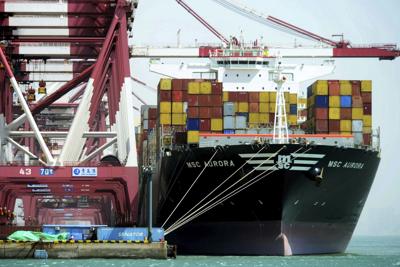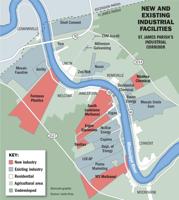Officials behind a $1.25 billion chemical plant proposed for St. James Parish say they are taking a step back to review the scale and location of the new facility.
Wanhua Chemical, a China-based company with investment ties to a municipal government in that nation, announced in November it would be building an MDI complex on 250 acres next to the Occidental Chemical plant along the Mississippi River.Â
But William Day, an official with Wanhua's U.S. operations, said in a statement late Wednesday that the project targeting the Convent area is under review.
"Due to (a) significant increase in the capital expenditure budget of the MDI Project in the past year, the company decided to change the scope of the project," Day wrote in a prepared statement in response to questions. "A new project location is also under review."
MDI, or methylene diphenyl isocyanate, is often used to make polyurethane foam for bedding, furniture, automotive interiors and the cushiony material placed under carpet.
VACHERIE — Wanhua Chemical's bid to build a $1.25 billion chemical plant in Convent hit delays Wednesday after the company's plans to seek exe…
Wanhua's statement did not give reasons for the increase in capital expenditures, but the company had, before the November announcement to locate in Convent, expressed worry in the summer of 2018 about President Donald Trump's trade fight with China and the effect of the 25% tariffs he had imposed.
Company officials said then that the steel and aluminum tariffs were adding "tens of millions" of dollars in costs.Â
Last spring, Louisiana officials unveiled a major foreign investment project in the state: A $1.12 billion manufacturing complex by Chinese ch…
Since Wanhua decided to locate in St. James Parish, the company has tried with mixed success to seek breaks in those tariffs from the U.S. trade representative and has a request pending for Foreign Trade Zone status through the Port of South Louisiana.
Wanhua's plant would potentially be in a Foreign Trade subzone, which would enable the company not to pay tariffs for goods produced in Louisiana before export.
Day's statement does not affirm the company would remain in Louisiana, only in the United States.
"Nevertheless, the company's plan and commitment to build an MDI facility in the U.S. remains unchanged, and will continue to implement it," Day said.
Even before the company's statements Wednesday, the project had run into road blocks.
Wanhua's pursuit of the trade zone status, which raises the potential of affecting local tax revenues without an agreement excluding those breaks, came as news to St. James Parish officials in June. The Parish Council referred the project back to its Planning Commission last month as part of an appeal by environmental groups.
Then, on Monday, the Planning Commission deferred action for 30 days. Parish officials have said that the deferral was to allow the commission time to digest the impact of the Foreign Trade Zone information — which was not available to the commission when it first approved the plant — and also disclosures from environmental groups that Wanhua has a local Chinese government investor.
The facility needs a land use approval from the parish to proceed.
Two environmental groups and two St. James Parish residents claim the Parish Council and Planning Commission violated state open meetings law …
The community and environmental groups have been fighting the wave of new industrial facilities proposed for the parish's north end and, in particular, the use of deadly phosgene gas at the Wanhua facility about a mile from homes in Convent. Company officials have said they would follow environmental and safety protocols to protect against leaks or other accidents.Â
Don Pierson, secretary of the state Department of Economic Development, said the agency "is aware that Wanhua has been facing a handful of challenges regarding its proposed St. James Parish project, and that the company is in the process of re-evaluating its project scope.”
He didn't offer more details.
The proposed MDI plant would have been supplied with some key chemical inputs from OxyChem's plant on River Road.Â
St. James Parish President Timmy Roussel said in a statement Thursday that Wanhua officials have informed the parish that rising construction cost estimates led the company to consider reducing the plant's footprint by two-thirds.
It's not clear what effect the reduction in size would have on Wanhua's need for product from OxyChem.
After Wanhua's reduced size was discussed, "we are told that OxyChem pulled back on their land option," Roussel said. He said Wanhua is seeking another parcel.
OxyChem officials declined to offer any details.Â
"We would refer you to Wanhua," Shane Boyd, a spokesman for OxyChem, wrote Wednesday evening. "We have nothing to offer regarding your inquiry."
In their appeal to St. James Parish government, lawyers with the Tulane University Environmental Law Clinic claimed that Wanhua officials have misrepresented the extent of the Chinese government's ties to Wanhua and asserted the state controls the company.
They have produced a 2018 annual report from Wanhua Chemical Group Co. Ltd. that says one of its subsidiaries is Wanhua Chemical U.S. Operations LLC, which is pushing the St. James project.
"The ultimate controlling shareholder of Wanhua Chemical Group Co. is the state-owned Assets Supervision and Administration Commission of Yantai Municipal Government," the annual report says.
The Tulane lawyers assert this local government entity is under the control of the Communist Party and Chinese national government, citing the long-standing primacy of the party and state in Chinese society.
In a past interview, Jim Newport, general manager of Wanhua Chemical's U.S. operations, said the real estate investment firm owned by the Yantai city government has a 18% to 20% stake in Wanhua, which is publicly traded on the Shanghai Stock Exchange.
"It is not a controlling interest in the company. It is the majority shareholder," Newport said.Â
The remaining 80% of Wanhua shares are held by other investors. Wanhua's board answers to shareholders and makes market- and compliance-based decisions like any other publicly traded company, Newport said.





